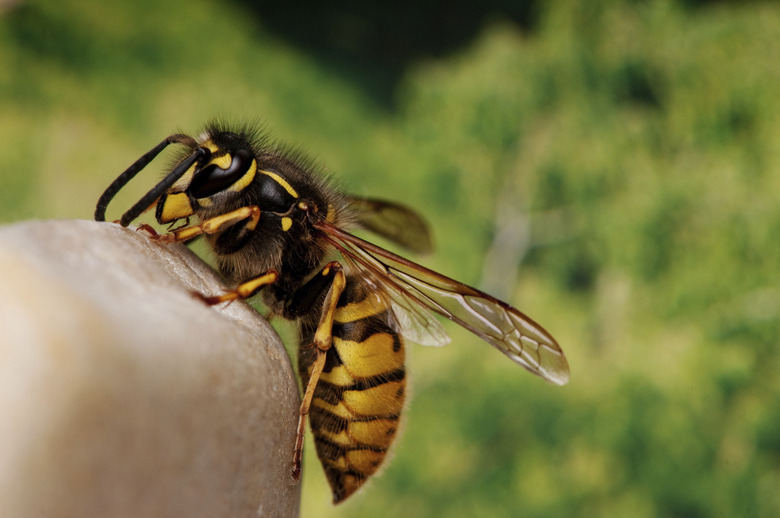Natural Predators Of Wasps
When you spot a yellow and black insect, you probably hope it's a bee simply because you don't want to cross paths with a wasp! Known for their aggression, wasps pack one heck of a painful sting, and many people view them as pests. However, different kinds of wasps do provide important food for other animals, including other insects, birds and mammals.
Natural Predators of Wasps: Other Insects
Natural Predators of Wasps: Other Insects
Many different insects prey on wasps – and vice versa! Some examples of insects that prey on all types of wasps include spiders, robber flies, centipedes, dragonflies and praying mantises.
Robber flies in particular pose a danger to wasps, though they certainly don't discriminate. These insects feast on dragonflies, grasshoppers, bees, spiders and more. They attack wasps in the air, injecting them with a neurotoxin to immobilize them and then eat them.
Another voracious predator – dragonflies – are known for their hunting prowess. Known as "dragon" flies for a reason, these predatory insects can expertly pursue, capture and consume wasps as well as other insects. They also feed on flies, bees, butterflies and other flying insects.
Praying mantises are also natural predators of wasps. Well known for ruthlessly eating their mates, these insects also hunt and eat a range of other prey. In addition to eating types of wasps, they also feed on creatures such as spiders, flies, grasshoppers and bees.
Natural Predators of Wasps: Birds
Natural Predators of Wasps: Birds
Many different bird species eat wasps, and some of them even specialize in hunting bees and wasps in particular. In fact, one group of species even takes the crown with the name bee-eater, and you can be sure they are happy with any yellow and black insect.
The bee-eater family of birds contains over 22 different species, all of which feed on insects. They specialize in bees and wasps, using unique hunting behaviors adapted for feeding on stinging insects. The birds snatch the wasp from the air, smack it against a rock or tree branch to stun it, and then rub off the stinger on a hard surface to remove the toxins before swallowing it.
Other natural predators of wasps are the tanagers. Summer Tanagers in particular feed heavily on bees and wasps, catching them in midair with expert-level skill. Like the bee-eater, the Summer Tanager smashes the stinging wasp against a hard surface until it is quite dead before swallowing it.
When you think of natural predators of wasps, you likely don't picture birds of prey. However, the Red-throated Caracara feeds almost exclusively on bees and wasps. Natives of Central and South America, this caracara species rips apart the nests of bees and wasps to feed on the adult insects and the larvae inside.
Natural Predators of Wasps: Mammals
Natural Predators of Wasps: Mammals
Many different mammal species feed on different kinds of wasps. Most species that eat bees or bee larvae are also natural predators of wasps as well. Some examples include the honey badger and the black bear.
Honey badgers are known and named for tearing apart beehives in search of the honey and bee larvae inside. But honey badgers certainly do not put their nose up at any food source, and wasp larvae make for just as tasty of a meal as bee larvae. The honey badger, also known as the ratel, also feeds on other insects, carrion, birds and small mammals.
Another animal known for its proclivity towards honey, the black bear also feeds on wasps and their larvae as well. Like honey badgers, black bears do eat honey, but black bears raid beehives and wasp nests primarily to feed on insects and larvae, which are high in protein and more nutritious. In addition to eating many types of wasps, they also eat a wide variety of other food sources, including fruits and berries, small mammals, carrion, birds, eggs, reptiles and amphibians.
Cite This Article
MLA
Zinni, Yasmin. "Natural Predators Of Wasps" sciencing.com, https://www.sciencing.com/natural-predators-of-wasps-12298866/. 30 September 2021.
APA
Zinni, Yasmin. (2021, September 30). Natural Predators Of Wasps. sciencing.com. Retrieved from https://www.sciencing.com/natural-predators-of-wasps-12298866/
Chicago
Zinni, Yasmin. Natural Predators Of Wasps last modified March 24, 2022. https://www.sciencing.com/natural-predators-of-wasps-12298866/
